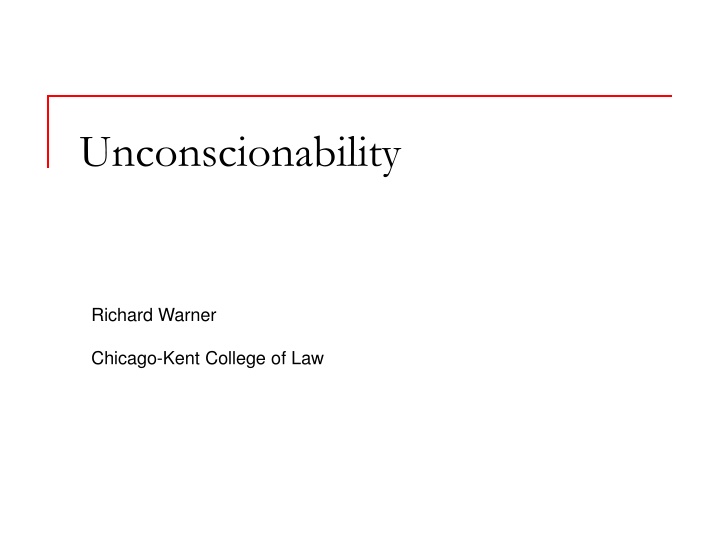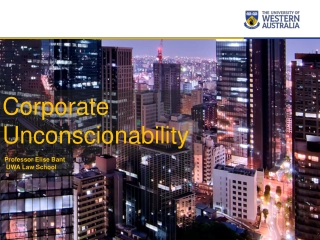Unconscionability
Unconscionability addresses the fairness of contracts, examining both procedural and substantive aspects to determine enforceability. Explore the Henningsen v. Bloomfield Motors case and the role of disclaimers in limiting liability.
Download Presentation

Please find below an Image/Link to download the presentation.
The content on the website is provided AS IS for your information and personal use only. It may not be sold, licensed, or shared on other websites without obtaining consent from the author.If you encounter any issues during the download, it is possible that the publisher has removed the file from their server.
You are allowed to download the files provided on this website for personal or commercial use, subject to the condition that they are used lawfully. All files are the property of their respective owners.
The content on the website is provided AS IS for your information and personal use only. It may not be sold, licensed, or shared on other websites without obtaining consent from the author.
E N D
Presentation Transcript
Unconscionability Richard Warner Chicago-Kent College of Law
Lack of meaningful choice? Yes No Serious improper threat? Yes Doctrines do not apply No Duress Undue influence? Yes No Undue influence Substantively unfair? Yes No Unconscionable Violates public policy? Yes No No public policy argument Unenforceable Lack of meaningful choice + substantive unfairness = unconscionability
Compare Reasonable Expectations The reasonable expectations doctrine requires that the consumer have an expectation a specific contractual term or terms. E.g. I am covered for my whole air trip. Unconscionability does not require any such expectation.
The Doctrine A term (or an entire contract) is unenforceable if Procedural unconscionability: there was a lack of meaningful choice in the formation of the contract, and Substantive unconscionability: the term (or contact) is substantively unfair.
Henningsen v. Bloomfield Motors (1960) A couple bought a car and then the steering went out after 468 miles injuring Mrs. Henningsen. Suppose that all the contract said was "Sold, one car for $2000". Could Mrs. Henningsen recover for breach of warranty? Yes, the car is a good, and the UCC implies a warranty of merchantability--that the car will be fit for the purpose for which it is ordinarily used. The car clearly was not fit for this.
The Disclaimer of Liability The contract in Henningsen limited the manufacturer's liability. It in part that the manufacturer would not be liable personal, the type of injury sustained by Mrs. Henningsen. There is no general rule that says you cannot disclaim warranties. You can. But there limitations. Unconscionability doctrine is one of them.
The Clause in Henningsen 7. It is expressly agreed that there are no warranties, express or implied, made by either the dealer or the manufacturer on the motor vehicle, chassis, or parts furnished hereunder except as follows: The manufacturer warrants each new motor vehicle (including original equipment placed thereon by the manufacturer except tires), chassis or parts manufactured by it to be free from defects in material or workmanship under normal use and service. Its obligation under this warranty being limited to making good at its factory any part or parts thereof which shall, within ninety (90) days after delivery of such vehicle to the original purchaser or before such vehicle has been driven 4,000 miles, whichever event shall first occur, be returned to it with transportation charges prepaid and which its examination shall disclose to its satisfaction to have been thus defective; this warranty being expressly in lieu of all other warranties expressed or implied, and all other obligations or liabilities on its part, and it neither assumes nor authorizes any other person to assume for it any other liability in connection with the sale of its vehicles.
Review The Doctrine A term (or an entire contract) is unenforceable if there was a lack of meaningful choice in the formation of the contract, and the term (or contact) is substantively unfair.
Unconscionability in Henningsen Was there was a lack of meaningful choice in the formation of the contract? The court notes: A standard form, no negotiation contract with gross inequality in bargaining power. The Henningsen s did not read the clause. No one drew their attention to it or referred to it. It was printed in small print on the back of the contract. All new car dealers used the same contract, so they could not go elsewhere to get better terms.
Lack of Meaningful Choice in Henningsen The court notes: A standard form, no negotiation contract with gross inequality in bargaining power. The Henningsen s did not read the clause. No one drew their attention to it or referred to it. It was printed in small print on the back of the contract. All new car dealers used the same contract, so they could not go elsewhere to get better terms.
Unfairness Is the clause substantively unfair? The court notes: The lawmakers did not authorize the automobile manufacturer to use its grossly disproportionate bargaining power to relieve itself from liability and to impose on the ordinary buyer, who in effect has no real freedom of choice, the grave danger of injury to himself and others that attends the sale of such a dangerous instrumentality as a defectively made automobile. In short, it is unfair to disclaim liability for personal injury.
Bragg v. Linden Research (2007) Linden Research owns the virtual world Second Life, https://secondlife.com/. Bragg was a Second Life subscriber who owned virtual land in the Second Life world Bragg owned virtual land in Second Life. Under the ToS, owned land is not transferable to another user for real life money. Bragg sold land to another user for $300. Second Life discontinued Bragg s account. Bragg sued claiming he was Second Life fraudulently induced him to become a Second Life Subscriber.
The Arbitration Clause Any dispute or claim arising out of or in connection with this Agreement or the performance, breach or termination thereof, shall be finally settled by binding arbitration in San Francisco, California under the Rules of Arbitration of the International Chamber of Commerce by three arbitrators appointed in accordance with said rules. The question in the case: Is this clause unconscionable?
Procedural Unconscionability A contract of adhesion is a take or leave it contract. Bragg: A contract of adhesion, in turn, is a standardized contract, which, imposed and drafted by the party of superior bargaining strength, relegates to the subscribing party only the opportunity to adhere to the contract or reject it. Under California law, a contract of adhesion is procedurally unconscionable. The Linden ToS is a contract of adhesion and so procedurally unconscionable under California law.
Unconscionable Arbitration Clauses Five considerations. Lack of mutuality Costs of arbitration Venue Confidentiality provisions Legitimate business realities We will just look at the first three.
Lack of Mutuality in Bragg Lack of mutuality is a significant imbalance in the parties rights and obligations. The Second Life Terms of Service: Linden has the right at any time for any reason or no reason to suspend or terminate your Account, terminate this Agreement, and/or refuse any and all current or future use of the Service without notice or liability to you. The court comments: the TOS provides Linden with a variety of one-sided remedies to resolve disputes, while forcing its customers to arbitrate any disputes with Linden.
Factors The Court Notes The court notes: [1] Whether or not a customer has breached the Agreement is determined in Linden's sole discretion. [2] Linden also reserves the right to return no money at all based on mere suspicions of fraud or other violations of law. [3] Finally, the TOS state that Linden may amend this Agreement ... at any time in its sole discretion by posting the amended Agreement [on its website].
In Regard to the Third Point Linden's right to modify the arbitration clause is also significant. The effect of [Linden's] unilateral right to modify the arbitration clause is that it could ... craft precisely the sort of asymmetrical arbitration agreement that is prohibited under California law as unconscionable. This lack of mutuality supports a finding of substantive unconscionability.
Costs of Arbitration The costs of arbitration cannot be greater than the costs the consumer would bear with a court filing. Such schemes are unconscionable where they impose[ ] on some consumers costs greater than those a complainant would bear if he or she would file the same complaint in court. Id. . . . the Ninth Circuit held that a scheme requiring AT & T customers to split arbitration costs with AT & T rendered an arbitration provision unconscionable.
Venue The TOS also require that any arbitration take place in San Francisco, California. California law dictates that it is not reasonable for individual consumers from throughout the country to travel to one locale to arbitrate claims involving such minimal sums. . . . Indeed, limiting venue to [Linden's] backyard appears to be yet one more means by which the arbitration clause serves to shield [Linden] from liability instead of providing a neutral forum in which to arbitrate disputes.


